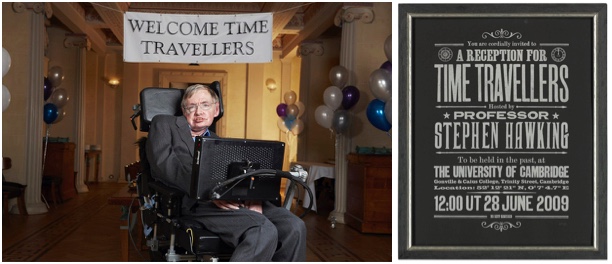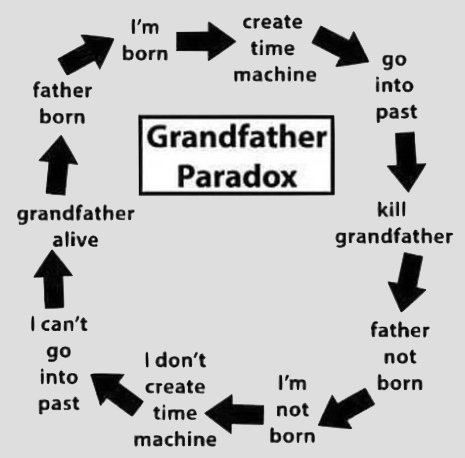Physicist: It already has! Or rather, it already will be.
Once time travel has/will have been invented, you’d think that said inventor could just go back in time and show off their invention, or give it to some ancestor (or even become some ancestor) so they could be born into old money.
But despite being both common and world-changing, time travel is intrinsically very low-key. In the 20th century the world population increased from 1.6 to 6 billion people, and even though time travelers account for about 3 of those 4.4 billion new folk, evidence for their presence is almost impossible to find. It turns out that time machines are just like every other machine; they don’t exist if they’re not invented. So whatever else anyone does with a time machine, it didn’t/won’t affect the invention of time machines themselves.
In 1992 Steven Hawking derived the “chronology protection conjecture“, which posits that “closed time-like curves” are impossible. Moving along a time-like path is what you (and every other chunk of matter in the universe) are doing right now; moving slower than light and experiencing time in the usual way. Moving along a closed time-like path is like going for a walk in the woods and following a trail that returns you home yesterday. Hawking showed that closed time-like curves produce “feed back” that destroys everything involved. In other words: Timecop rules.
Ever empirical, on June 28th, 2009 Doc Hawk threw a party for time travelers and (to ensure only time travelers showed up) he kept it secret until June 29th, when he sent out invitations. Save the date!
To his bemused shock, Hawking’s soiree was very well attended. He claims to have met “people” from as far afield as 70189324233 AD, the year in which the invitation, as well as the spaciotemporal coordinates of Earth, were unceremoniously overwritten and forgotten during “The Great System Update”.

Left: Steven Hawking, blocking the photographer from getting into the party behind him. Right: The invitation he sent out the next day. Hope you can/did make it!
At his party, the Hawk discovered three things. First, time travel is not just possible, but easy. Second, closed time-like curves are impossible, but that’s not how time travel works. And third, time travelers don’t leave much evidence behind, because they couldn’t if they tried (and don’t when they do).
Hawking later wrote, “Dear Diary, [I] wasn’t sure about actually buying champagne for the affair, since I knew (or thought I knew) that this was all a [silly stunt]. I’m glad I did! Time travelers are a cagey lot and the evening didn’t really get into full swing until the 7th or 8th crate was opened. A man (perhaps?) who introduced himself as the Designate Demithrall of the North Antarctic Seasteader Federation in 4372, mentioned that the key to time travel is my own work on imaginary time and that it’s ‘obvious really, if you think about it’. This is remarkable! But in the sober light of da [sic.] I can’t help wondering if the Designate Demithrall wasn’t drunk or sarcastic or both. Forty-forth century humour is really hard to read.”
When a time traveler intends to give instructions to someone in the past to help them be the first person to build a time machine, they inevitably and accidentally don’t. The retro-self-cohesion principle of the time-line prevents grandfather paradoxes, so neither time travelers nor machines can change the logic of their own history. In other words: not Back to the Future rules. For example, if you go back in time to kill your own grandfather, then you won’t exist to go back in time and do said killing. You have to come from somewhen. Inescapably, you’ll either get the wrong guy or fail to get the right guy. In other words: Bill and Ted rules. Time travel is possible, and even common, but you can’t change things so much as confirm them. In the archetypal example, Rufus goes back in time to ensure the Wild Stallions succeed in bringing about peace and enlightenment throughout the universe, and he knows they do because he was/will be there to help.

The “grandfather paradox”. Like all paradoxes, this only shows up on paper. It can’t happen in reality.
In the same way that you don’t (presently) worry about your murderous unborn grandchildren, the inventor of time travel is immune to hints. No matter how many time travelers they may incidentally meet, none of them will ever get past general pleasantries; the topic of time travel is logically verboten. The same holds for common knowledge. Presumably, the reason that you can’t go online and find the schematics for a (functional) time machine is that the future inventor of time travel doesn’t live in a cave. The first thing they’re likely to do before getting down to work is a quick internet search to see if they’re reinventing the wheel (or flux capacitor), so all the universe must conspire to make that internet search fail. Like time travelers themselves, the idea has to come from somewhen. Being aware of this tautological time travel truth, and possibly having read Hawking’s published diary, the Designate Demithrall was most likely safeguarding the logical consistency (and existence) of the very conversation he was in by filling it with sarcasm and misdirection.
So if you ever meet anyone who claims to be a time traveler and makes no attempt to support their claim, then they’re probably telling you the truth. Time machines are more common then cellphones, but they’re literally impossible to talk about. And if you yourself are a time traveler, remember that we ran/will run out of prosecco about halfway through Hawking’s thing, so BYOB.


















